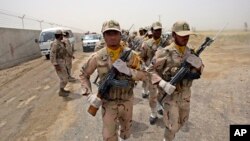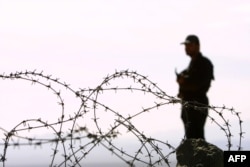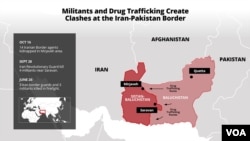Iran is urging neighboring Pakistan to cooperate in securing freedom for 14 Iranian border guards, including intelligence officers, after militants kidnapped them Tuesday in a predawn raid along the border.
The abductees were stationed at a border post in Iran's Mirjaveh area when they came under attack from “counterrevolutionary groups,” said Iran’s Islamic Revolutionary Guards Corps (IRGC) in a statement carried on state media.
The kidnapping occurred in Iran's southeastern Sistan-Baluchistan province, which has a long history of unrest from separatist militants. It borders Pakistan’s sparsely populated province of Baluchistan.
"We expect Pakistan to confront these terrorist groups that are supported by some regional states and immediately release the kidnapped Iranian forces," the media wing of the IRGC said. It did not name any country, but Iran blames rival Saudi Arabia for supporting anti-Iran groups, allegations Riyadh denies.
Senior Pakistani officials in the provincial capital of Quetta said they have not received any official communication from the Iranian side regarding the incident.
“As a routine matter, they (Iranians) always inform us in writing when such incidents happen but so far they have not contacted us,” provincial Home Secretary Haider Ali told VOA.
Iranian leaders allege anti-Iran militants use Pakistani territory for plotting cross-border attacks. The allegation remains a source of tension in Islamabad’s otherwise friendly and traditionally close relationship with Tehran.
There were no immediate claims of responsibility, although some Iranian media reported the “the Jaish ul-Adl terrorist group” was behind the kidnapping.
The remote Iranian border region where Tuesday’s incident occurred has been the scene of clashes involving Iranian forces and militants as well as drug traffickers.
Last month, Iranian guards killed four militants at a border crossing with Pakistan, including the deputy commander of Jaish ul-Adl. The militant outfit has been blamed for attacks on Iranian military targets.
Pakistan and Iran share a more than 900-kilometer-long border. In recent months, the Pakistani military has deployed thousands of additional troops on the border to boost security. Islamabad previously has captured and handed over to Tehran leaders and members of anti-Iran groups.
Baluchistan itself is under attack from local Baloch insurgents. The Pakistani province, which also borders Afghanistan, allegedly shelters members of the Taliban insurgency fighting U.S.-backed Afghan security forces on the other side.
Iranian separatists justify their violent campaign, saying it is retaliation for what they call Iran’s oppression against Sistan-Baluchistan’s predominantly Sunni population.
Last month, militants disguised as Iranian soldiers opened fire on a military parade in southwestern Iran, killing 24 people and wounding dozens more.



